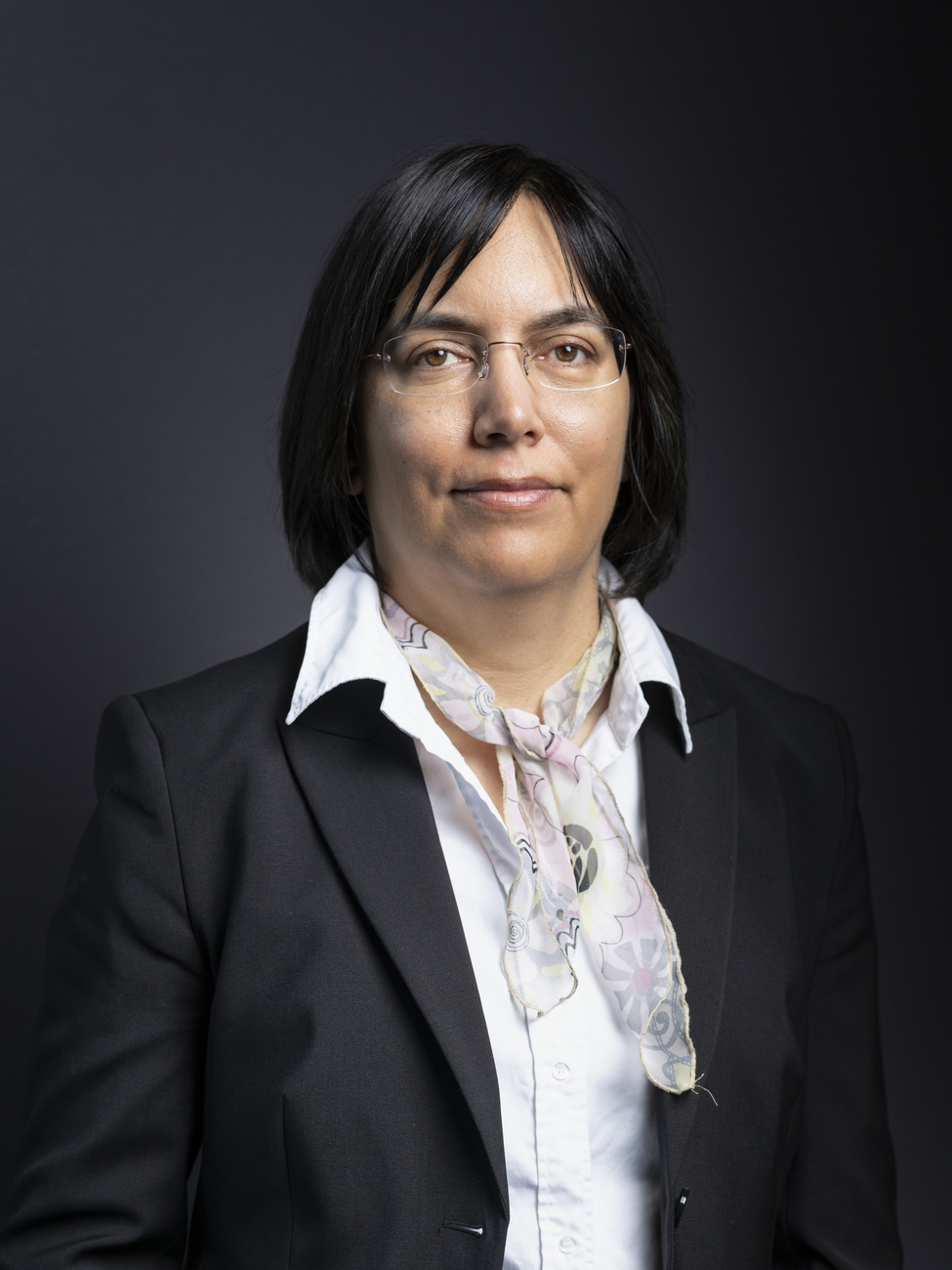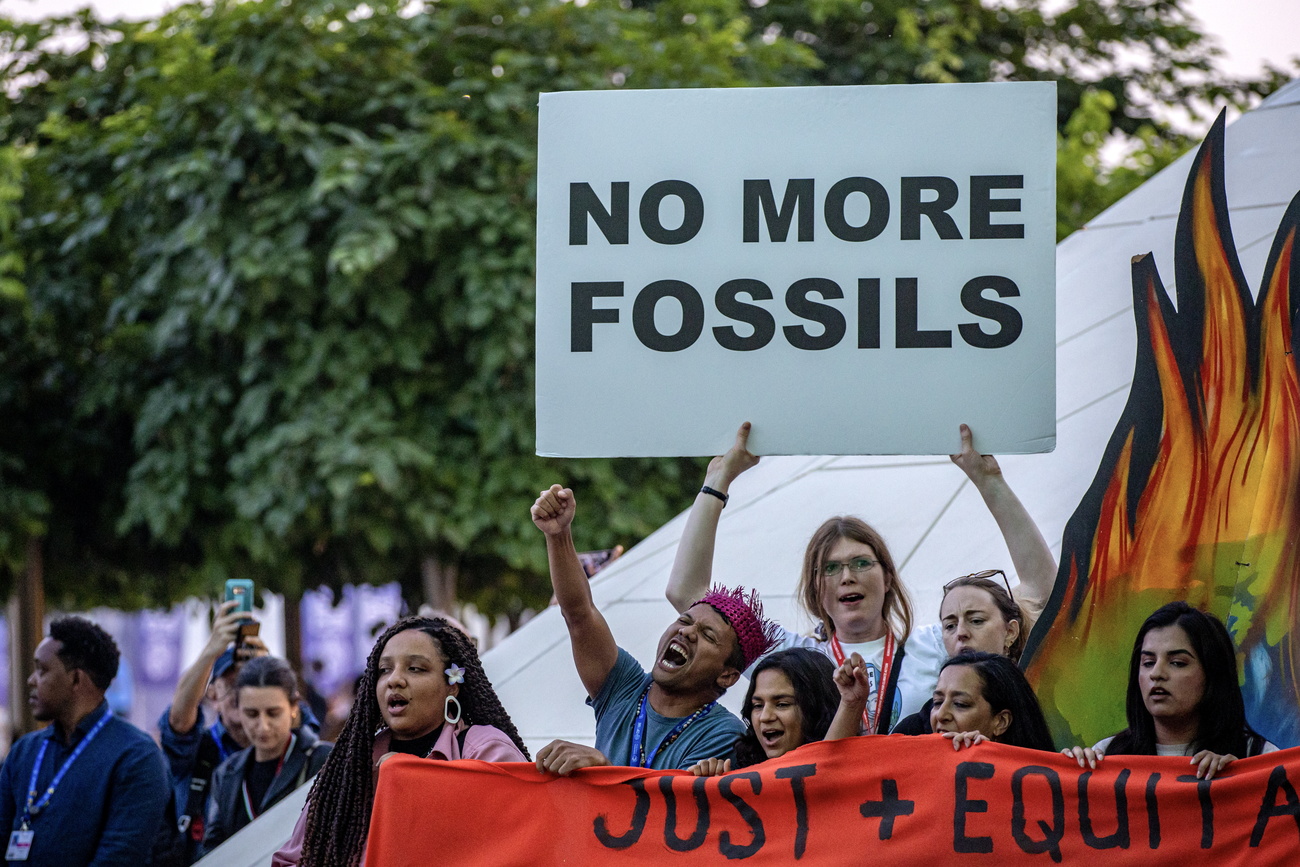
COP28: Is this the beginning of the end of fossil fuel era?

The COP28 climate summit in Dubai adopted a final deal on Wednesday that for the first time calls on nations to transition away from fossil fuels to avert the worst impacts of climate change. How “historic” is this agreement, as some leaders have claimed? SWI swissinfo.ch asked Sonia Seneviratne, a climate specialist at the federal technology institute ETH Zurich.
The global climate pact agreed at the COP28 summit calls for a tripling of renewable energy capacity globally by 2030, speeding up efforts to reduce coal, and accelerating technologies such as carbon capture and storage that can clean up hard-to-decarbonise industries. The headline announcement to “transition away from fossil fuels” rather than “phase out” boils down to the first time the world has expressed a unified desire to eventually end the oil age. It also sends a resounding signal to international markets.
“This is a historic result,” said Sultan Ahmed Al Jaber, president of COP28. It is the first time in 30 years of UN climate negotiations that the main cause of global warming – fossil fuels – has been mentioned in a final conference document.

Sonia SeneviratneExternal link, a climate researcher and professor at the ETH Zurich, and a member of the Intergovernmental Panel on Climate Change (IPCC), prefers to talk of a partial success. “We avoided the worst because the draft agreement that was circulating two days before the end of the conference [in which no exit from fossil fuels was mentioned] was extremely weak,” she says.
SWI swissinfo.ch: COP28 ended with an agreement which for the first time expresses the need to start reducing global consumption of oil and coal. Are you satisfied with this decision?
Sonia Seneviratne: Only partially. The fact that there is a mention in the final declaration calling for a transition away from fossil fuels is positive. But the text lacks quantified objectives and open questions remain, for example on the exact meaning of the term “transition”.
In addition, the proposal for an explicit exit from fossil fuels, known as “phase out” in English, was abandoned, which would have constituted a clearer formulation.
I like the image used by the representative of the Marshall Islands: we have built a canoe with a weak hull that is taking on water but that is the only option we have to get there.
SWI: Oil-producing countries managed to get the use of CO2 capture and storage included in the final conference text. What role can these technologies play in tackling the climate crisis?
S.S.: We also need these technologies because to stabilise global warming, we need to get to net-zero emissions and we know that in some areas this won’t be easy. However, their potential is limited.
Currently, the amount of CO2 removed from the atmosphere or captured corresponds to less than 1% of emissions. When climate neutrality is achieved, this share will be 10%, according to the scenarios evaluated in the latest IPCC report. This means that the remaining 90% of emissions will have to be reduced to zero. There is no possibility of compensation for the majority of current emissions.
SWI: Will the agreement reached in Dubai make it possible to limit global warming to 1.5°C, one of the main objectives of the 2015 Paris climate agreement?
S.S.: That’s difficult to say, especially because we are not on the right trajectory. Nevertheless, the Dubai agreement reaffirms countries’ desire to limit global warming to 1.5°C. We should already start reducing greenhouse gas emissions, especially CO2, as quickly as possible. However, in recent years we have seen an increase. I do not exclude that we will reach the objective, but much greater efforts are absolutely necessary.
The Swiss federal authorities have welcomed the consensus deal reached on the gradual elimination of fossil fuels by 2050 during the Conference of the Parties on Climate Change (COP28), said the Federal Office for the Environment (FOEN) in a press releaseExternal link on December 13. Bern also welcomes the adoption of an interim assessment (Global Stocktake) of states’ actions, with recommendations to maintain the objectives of the 2015 Paris climate agreement.
The wording chosen at COP28 also authorises the use of CO2 capture and storage technologies, notes the FOEN. Switzerland will ensure that these technologies are only used for emissions that are difficult to avoid.
The Swiss authorities are also satisfied that the rules for managing the loss and damage fund, intended to support the poorest countries particularly affected by global warming, were defined at the Dubai summit.
Source: Keystone-SDA
Edited by Virginie Mangin/Translated from French by Simon Bradley

More
COP28 was ‘partial success’, says Swiss environmental group

In compliance with the JTI standards
More: SWI swissinfo.ch certified by the Journalism Trust Initiative





























You can find an overview of ongoing debates with our journalists here . Please join us!
If you want to start a conversation about a topic raised in this article or want to report factual errors, email us at english@swissinfo.ch.